四年级一般疑问句
- 格式:ppt
- 大小:572.50 KB
- 文档页数:6
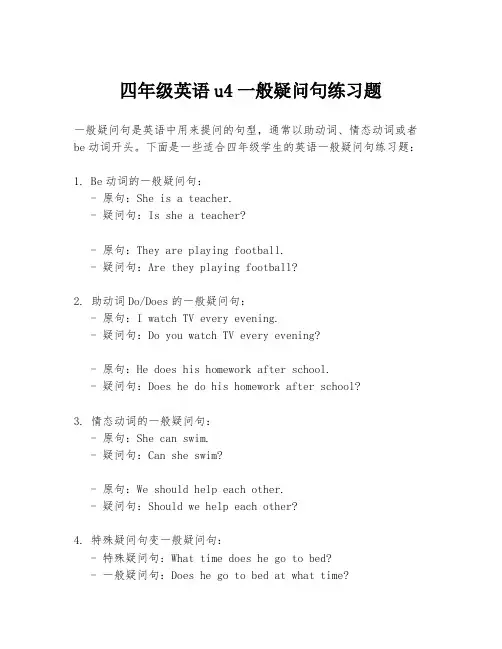
四年级英语u4一般疑问句练习题一般疑问句是英语中用来提问的句型,通常以助动词、情态动词或者be动词开头。
下面是一些适合四年级学生的英语一般疑问句练习题:1. Be动词的一般疑问句:- 原句:She is a teacher.- 疑问句:Is she a teacher?- 原句:They are playing football.- 疑问句:Are they playing football?2. 助动词Do/Does的一般疑问句:- 原句:I watch TV every evening.- 疑问句:Do you watch TV every evening?- 原句:He does his homework after school.- 疑问句:Does he do his homework after school?3. 情态动词的一般疑问句:- 原句:She can swim.- 疑问句:Can she swim?- 原句:We should help each other.- 疑问句:Should we help each other?4. 特殊疑问句变一般疑问句:- 特殊疑问句:What time does he go to bed?- 一般疑问句:Does he go to bed at what time?5. 否定形式的一般疑问句:- 原句:They don't like apples.- 疑问句:Don't they like apples?6. 回答一般疑问句:- 问题:Is your father a doctor?- 肯定回答:Yes, he is.- 否定回答:No, he isn't.7. 选择疑问句:- 问题:Do you want to play basketball or soccer?- 回答示例:I want to play basketball.8. 含有some和any的一般疑问句:- 问题:Would you like some juice or milk?- 回答示例:I would like some juice.9. 含有频率副词的一般疑问句:- 问题:How often do you visit your grandparents?- 回答示例:I visit them every weekend.10. 含有there be结构的一般疑问句:- 问题:Is there a book on the table?- 回答示例:Yes, there is.这些练习题可以帮助学生熟悉一般疑问句的构成和回答方式,通过不断的练习,学生可以更加自如地使用英语进行日常交流。
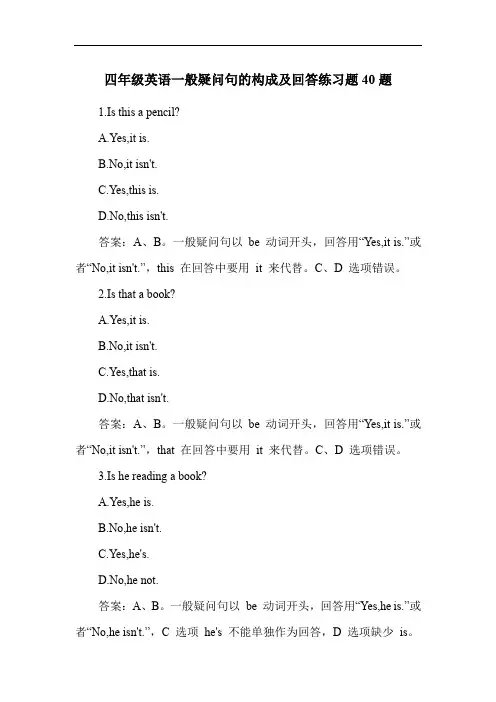
四年级英语一般疑问句的构成及回答练习题40题1.Is this a pencil?A.Yes,it is.B.No,it isn't.C.Yes,this is.D.No,this isn't.答案:A、B。
一般疑问句以be 动词开头,回答用“Yes,it is.”或者“No,it isn't.”,this 在回答中要用it 来代替。
C、D 选项错误。
2.Is that a book?A.Yes,it is.B.No,it isn't.C.Yes,that is.D.No,that isn't.答案:A、B。
一般疑问句以be 动词开头,回答用“Yes,it is.”或者“No,it isn't.”,that 在回答中要用it 来代替。
C、D 选项错误。
3.Is he reading a book?A.Yes,he is.B.No,he isn't.C.Yes,he's.D.No,he not.答案:A、B。
一般疑问句以be 动词开头,回答用“Yes,he is.”或者“No,he isn't.”,C 选项he's 不能单独作为回答,D 选项缺少is。
4.Is she singing a song?A.Yes,she is.B.No,she isn't.C.Yes,she's.D.No,she not.答案:A、B。
一般疑问句以be 动词开头,回答用“Yes,she is.”或者“No,she isn't.”,C 选项she's 不能单独作为回答,D 选项缺少is。
5.Is it a cat?A.Yes,it is.B.No,it isn't.C.Yes,this is.D.No,this isn't.答案:A、B。
一般疑问句以be 动词开头,回答用“Yes,it is.”或者“No,it isn't.”,C、D 选项中this 错误。
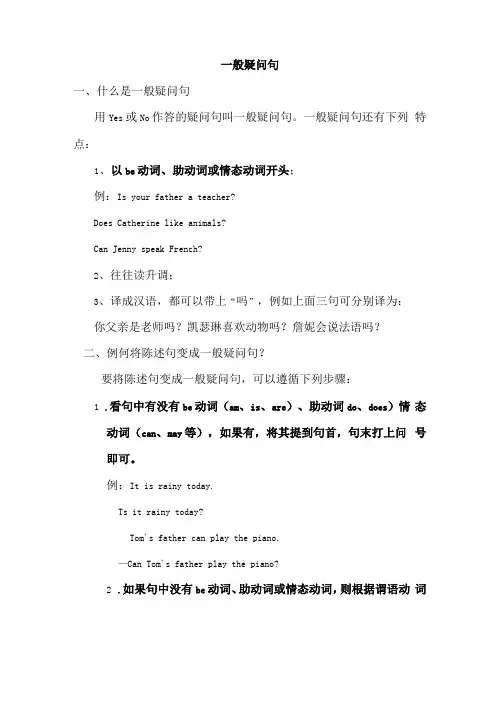
一般疑问句一、什么是一般疑问句用Yes或No作答的疑问句叫一般疑问句。
一般疑问句还有下列特点:1、以be动词、助动词或情态动词开头;例:Is your father a teacher?Does Catherine like animals?Can Jenny speak French?2、往往读升调;3、译成汉语,都可以带上“吗”,例如上面三句可分别译为:你父亲是老师吗?凯瑟琳喜欢动物吗?詹妮会说法语吗?二、例何将陈述句变成一般疑问句?要将陈述句变成一般疑问句,可以遵循下列步骤:1.看句中有没有be动词(am、is、are)、助动词do、does)情态动词(can、may等),如果有,将其提到句首,句末打上问号即可。
例:It is rainy today.Ts it rainy today?Tom's father can play the piano.—Can Tom's father play the piano?2.如果句中没有be动词、助动词或情态动词,则根据谓语动词的形式借助do的相应形式放在句首。
具体方法是:如果谓语动词是原形,则借do;如果谓语动词是一般现在时第三人称单数形式,则借does.记得助动词和情态动词后面接动词原形。
例:They go to school by bike.—Do they go to school by bike?Bill gets up at 6:30 every day.—Does bill get up at 6:30 every day?三.陈述句变一般疑问句应注意的事项陈述句变成一般疑问句除了遵循上述规则以外,还应注意下列几点:1.如果陈述句中有第一人称,则变问句时最好要变为第二人称。
例:I usually have lunch at school.—Do you usually have lunch at school?My father is playing soccer.—Is your father playing soccer?2.如果陈述句中有some,则变问句时往往要变成any。
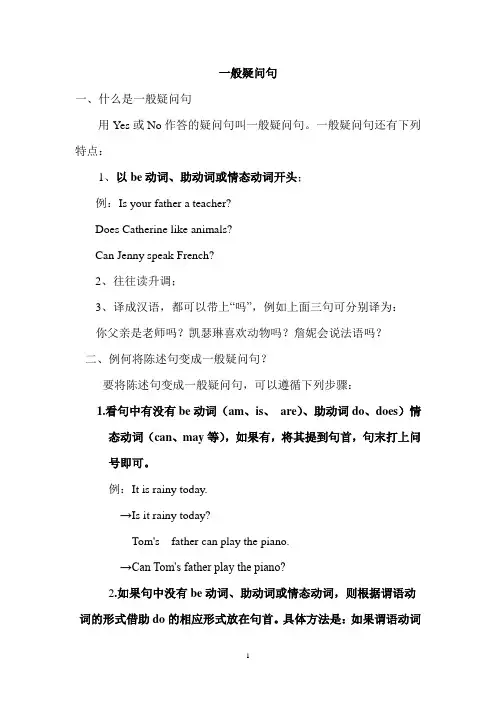
一般疑问句一、什么是一般疑问句用Yes或No作答的疑问句叫一般疑问句。
一般疑问句还有下列特点:1、以be动词、助动词或情态动词开头;例:Is your father a teacher?Does Catherine like animals?Can Jenny speak French?2、往往读升调;3、译成汉语,都可以带上“吗”,例如上面三句可分别译为:你父亲是老师吗?凯瑟琳喜欢动物吗?詹妮会说法语吗?二、例何将陈述句变成一般疑问句?要将陈述句变成一般疑问句,可以遵循下列步骤:1.看句中有没有be动词(am、is、are)、助动词do、does)情态动词(can、may等),如果有,将其提到句首,句末打上问号即可。
例:It is rainy today.→Is it rainy today?Tom's father can play the piano.→Can Tom's father play the piano?2.如果句中没有be动词、助动词或情态动词,则根据谓语动词的形式借助do的相应形式放在句首。
具体方法是:如果谓语动词是原形,则借do;如果谓语动词是一般现在时第三人称单数形式,则借does.记得助动词和情态动词后面接动词原形。
例:They go to school by bike.→Do they go to school by bike?Bill gets up at 6:30 every day.→Does bill get up at 6:30 every day?三.陈述句变一般疑问句应注意的事项陈述句变成一般疑问句除了遵循上述规则以外,还应注意下列几点:1.如果陈述句中有第一人称,则变问句时最好要变为第二人称。
例:I usually have lunch at school.→Do you usually have lunch at school?My father is playing soccer.→Is your father playing soccer?2.如果陈述句中有some, 则变问句时往往要变成any 。

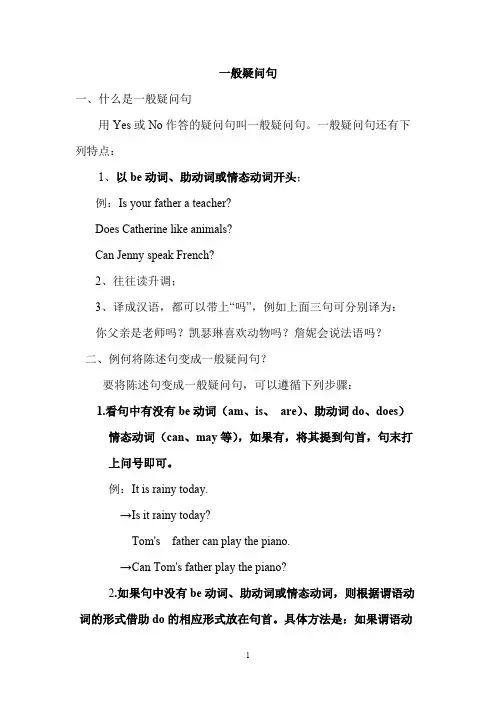
一般疑问句一、什么是一般疑问句用Yes或No作答的疑问句叫一般疑问句。
一般疑问句还有下列特点:1、以be动词、助动词或情态动词开头;例:Is your father a teacher?Does Catherine like animals?Can Jenny speak French?2、往往读升调;3、译成汉语,都可以带上“吗”,例如上面三句可分别译为:你父亲是老师吗?凯瑟琳喜欢动物吗?詹妮会说法语吗?二、例何将陈述句变成一般疑问句?要将陈述句变成一般疑问句,可以遵循下列步骤:1.看句中有没有be动词(am、is、are)、助动词do、does)情态动词(can、may等),如果有,将其提到句首,句末打上问号即可。
例:It is rainy today.→Is it rainy today?Tom's father can play the piano.→Can Tom's father play the piano?2.如果句中没有be动词、助动词或情态动词,则根据谓语动词的形式借助do的相应形式放在句首。
具体方法是:如果谓语动词是原形,则借do;如果谓语动词是一般现在时第三人称单数形式,则借does.记得助动词和情态动词后面接动词原形。
例:They go to school by bike.→Do they go to school by bike?Bill gets up at 6:30 every day.→Does bill get up at 6:30 every day?三.陈述句变一般疑问句应注意的事项陈述句变成一般疑问句除了遵循上述规则以外,还应注意下列几点:1.如果陈述句中有第一人称,则变问句时最好要变为第二人称。
例:I usually have lunch at school.→Do you usually have lunch at school?My father is playing soccer.→Is your father playing soccer?2.如果陈述句中有some, 则变问句时往往要变成any 。
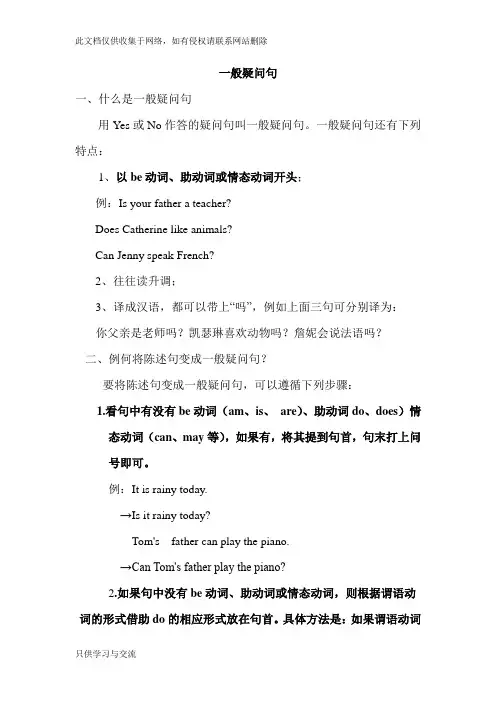
一般疑问句一、什么是一般疑问句用Yes或No作答的疑问句叫一般疑问句。
一般疑问句还有下列特点:1、以be动词、助动词或情态动词开头;例:Is your father a teacher?Does Catherine like animals?Can Jenny speak French?2、往往读升调;3、译成汉语,都可以带上“吗”,例如上面三句可分别译为:你父亲是老师吗?凯瑟琳喜欢动物吗?詹妮会说法语吗?二、例何将陈述句变成一般疑问句?要将陈述句变成一般疑问句,可以遵循下列步骤:1.看句中有没有be动词(am、is、are)、助动词do、does)情态动词(can、may等),如果有,将其提到句首,句末打上问号即可。
例:It is rainy today.→Is it rainy today?Tom's father can play the piano.→Can Tom's father play the piano?2.如果句中没有be动词、助动词或情态动词,则根据谓语动词的形式借助do的相应形式放在句首。
具体方法是:如果谓语动词是原形,则借do;如果谓语动词是一般现在时第三人称单数形式,则借does.记得助动词和情态动词后面接动词原形。
例:They go to school by bike.→Do they go to school by bike?Bill gets up at 6:30 every day.→Does bill get up at 6:30 every day?三.陈述句变一般疑问句应注意的事项陈述句变成一般疑问句除了遵循上述规则以外,还应注意下列几点:1.如果陈述句中有第一人称,则变问句时最好要变为第二人称。
例:I usually have lunch at school.→Do you usually have lunch at school?My father is playing soccer.→Is your father playing soccer?2.如果陈述句中有some, 则变问句时往往要变成any 。
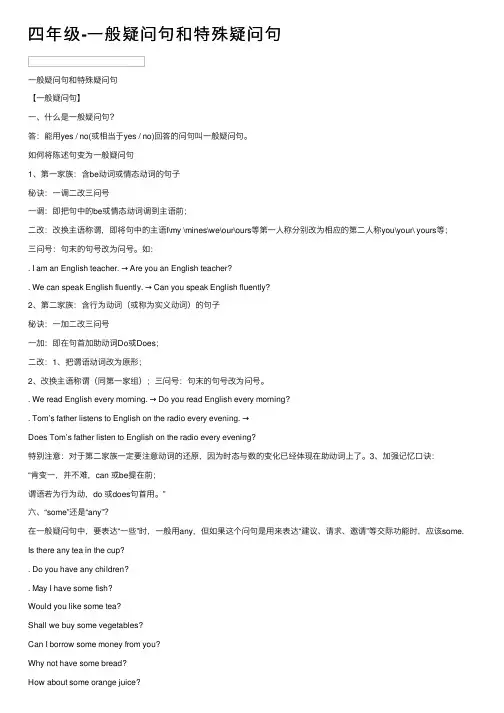
四年级-⼀般疑问句和特殊疑问句⼀般疑问句和特殊疑问句【⼀般疑问句】⼀、什么是⼀般疑问句?答:能⽤yes / no(或相当于yes / no)回答的问句叫⼀般疑问句。
如何将陈述句变为⼀般疑问句1、第⼀家族:含be动词或情态动词的句⼦秘诀:⼀调⼆改三问号⼀调:即把句中的be或情态动词调到主语前;⼆改:改换主语称谓,即将句中的主语I\my \mines\we\our\ours等第⼀⼈称分别改为相应的第⼆⼈称you\your\ yours等;三问号:句末的句号改为问号。
如:. I am an English teacher. → Are you an English teacher?. We can speak English fluently. → Can you speak English fluently?2、第⼆家族:含⾏为动词(或称为实义动词)的句⼦秘诀:⼀加⼆改三问号⼀加:即在句⾸加助动词Do或Does;⼆改:1、把谓语动词改为原形;2、改换主语称谓(同第⼀家组);三问号:句末的句号改为问号。
. We read English every morning. → Do you read English every morning?. Tom’s father listens to English on the radio every evening. →Does Tom’s father listen to English on the radio every evening?特别注意:对于第⼆家族⼀定要注意动词的还原,因为时态与数的变化已经体现在助动词上了。
3、加强记忆⼝诀:“肯变⼀,并不难,can 或be提在前;谓语若为⾏为动,do 或does句⾸⽤。
”六、“some”还是“any”?在⼀般疑问句中,要表达“⼀些”时,⼀般⽤any,但如果这个问句是⽤来表达“建议、请求、邀请”等交际功能时,应该some. Is there any tea in the cup?. Do you have any children?. May I have some fish?Would you like some tea?Shall we buy some vegetables?Can I borrow some money from you?Why not have some bread?How about some orange juice?练练吧⼀、改为⼀般疑问句1. I can skate well. __________ __________skate well?2. Kate does morning exercises every day.________ Kate________ morning exercises every day?3. The exam begins at nine. __________ the exam__________ at nine?4. Ann returned the book to the library yesterday._______ Ann_______ the book to the library yesterday?5. There's something to eat in the cupboard.__________ there__________ to eat in the cupboard?6. Mary likes scuba diving very much._________ Mary_________ scuba diving very much?⼆、⽤ is, are, am ,do, did ,does ,can 填空,然后变成⼀般疑问句1. His father ____an English teacher.2. These children_____ crying.3. They______swim.4. ______ you like reading English? Yes, I like reading English.5. How _____you go to school? I go to school on foot.6. What _____he like? He likes English.7. _____ his father go to work by bus? No, his father rides a bike to work.8. ______ your father read newspaper last night? No, he read a story book.9.I ____ a teacher.⼀般疑问句10. He ____ a doctor.⼀般疑问句11.You _____ good workers.⼀般疑问句12.______ (它是) an apple.⼀般疑问句13.They _____ workers.⼀般疑问句14.I _____ three books.⼀般疑问句He ____ many trees.⼀般疑问句I can speak English.⼀般疑问句They can swim.⼀般疑问句Shall he call you tonight?陈述句I need finish my work.⼀般疑问句【特殊疑问句】特殊疑问句要由疑问代词或疑问副词开头,询问的内容不同, 使⽤的疑问词也不同。
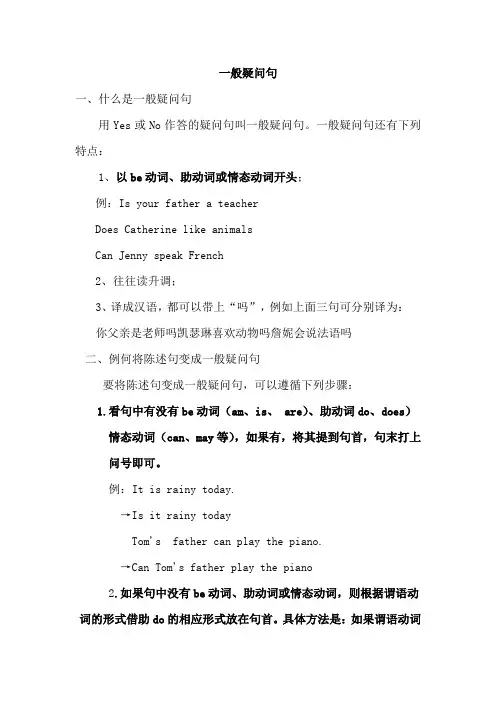
一般疑问句一、什么是一般疑问句用Yes或No作答的疑问句叫一般疑问句。
一般疑问句还有下列特点:1、以be动词、助动词或情态动词开头;例:Is your father a teacherDoes Catherine like animalsCan Jenny speak French2、往往读升调;3、译成汉语,都可以带上“吗”,例如上面三句可分别译为:你父亲是老师吗凯瑟琳喜欢动物吗詹妮会说法语吗二、例何将陈述句变成一般疑问句要将陈述句变成一般疑问句,可以遵循下列步骤:1.看句中有没有be动词(am、is、 are)、助动词do、does)情态动词(can、may等),如果有,将其提到句首,句末打上问号即可。
例:It is rainy today.→Is it rainy todayTom's father can play the piano.→Can Tom's father play the piano2.如果句中没有be动词、助动词或情态动词,则根据谓语动词的形式借助do的相应形式放在句首。
具体方法是:如果谓语动词是原形,则借do;如果谓语动词是一般现在时第三人称单数形式,则借does.记得助动词和情态动词后面接动词原形。
例:They go to school by bike.→Do they go to school by bikeBill gets up at 6:30 every day.→Does bill get up at 6:30 every day三.陈述句变一般疑问句应注意的事项陈述句变成一般疑问句除了遵循上述规则以外,还应注意下列几点:1.如果陈述句中有第一人称,则变问句时最好要变为第二人称。
例:I usually have lunch at school.→Do you usually have lunch at schoolMy father is playing soccer.→Is your father playing soccer2.如果陈述句中有some, 则变问句时往往要变成any 。
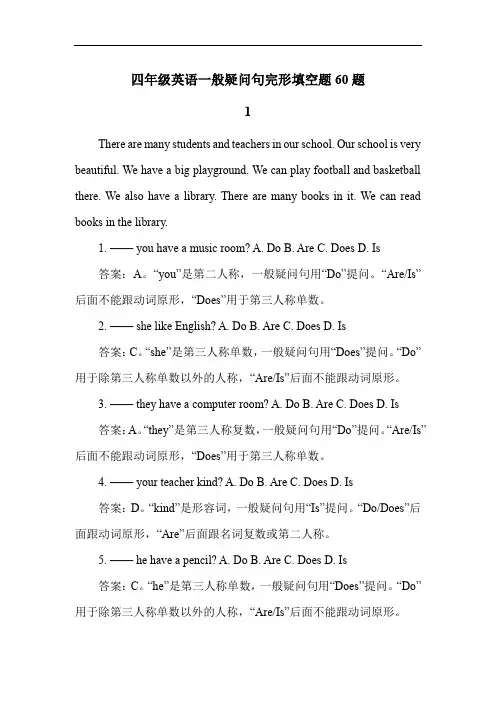
四年级英语一般疑问句完形填空题60题1There are many students and teachers in our school. Our school is very beautiful. We have a big playground. We can play football and basketball there. We also have a library. There are many books in it. We can read books in the library.1. —— you have a music room? A. Do B. Are C. Does D. Is答案:A。
“you”是第二人称,一般疑问句用“Do”提问。
“Are/Is”后面不能跟动词原形,“Does”用于第三人称单数。
2. —— she like English? A. Do B. Are C. Does D. Is答案:C。
“she”是第三人称单数,一般疑问句用“Does”提问。
“Do”用于除第三人称单数以外的人称,“Are/Is”后面不能跟动词原形。
3. —— they have a computer room? A. Do B. Are C. Does D. Is答案:A。
“they”是第三人称复数,一般疑问句用“Do”提问。
“Are/Is”后面不能跟动词原形,“Does”用于第三人称单数。
4. —— your teacher kind? A. Do B. Are C. Does D. Is答案:D。
“kind”是形容词,一般疑问句用“Is”提问。
“Do/Does”后面跟动词原形,“Are”后面跟名词复数或第二人称。
5. —— he have a pencil? A. Do B. Are C. Does D. Is答案:C。
“he”是第三人称单数,一般疑问句用“Does”提问。
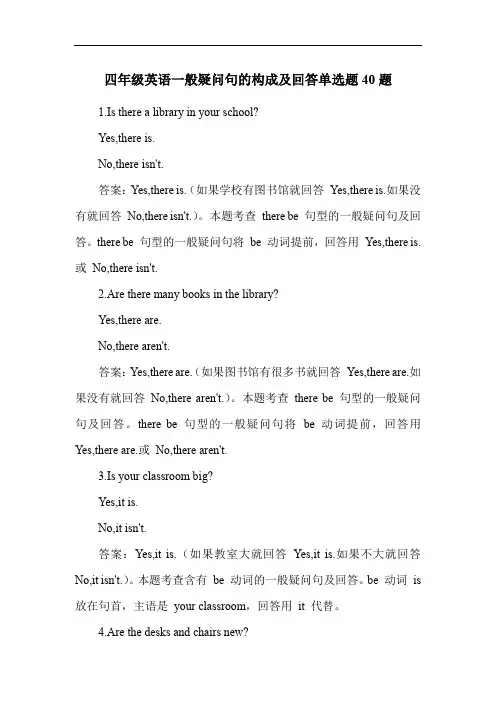
四年级英语一般疑问句的构成及回答单选题40题1.Is there a library in your school?Yes,there is.No,there isn't.答案:Yes,there is.( 如果学校有图书馆就回答Yes,there is.如果没有就回答No,there isn't.)。
本题考查there be 句型的一般疑问句及回答。
there be 句型的一般疑问句将be 动词提前,回答用Yes,there is.或No,there isn't.2.Are there many books in the library?Yes,there are.No,there aren't.答案:Yes,there are.( 如果图书馆有很多书就回答Yes,there are.如果没有就回答No,there aren't.)。
本题考查there be 句型的一般疑问句及回答。
there be 句型的一般疑问句将be 动词提前,回答用Yes,there are.或No,there aren't.3.Is your classroom big?Yes,it is.No,it isn't.答案:Yes,it is. 如果教室大就回答Yes,it is.如果不大就回答No,it isn't.)。
本题考查含有be 动词的一般疑问句及回答。
be 动词is 放在句首,主语是your classroom,回答用it 代替。
4.Are the desks and chairs new?Yes,they are.No,they aren't.答案:Yes,they are. 如果桌椅是新的就回答Yes,they are.如果不是就回答No,they aren't.)。
本题考查含有be 动词的一般疑问句及回答。
be 动词are 放在句首,主语是the desks and chairs,回答用they 代替。
1 一般疑问句一、一般疑问句:1、Did you read books? 你读书了吗?Yes, I did.是的,我读过了。
No, I didn’t. 不,我没有读过。
2、Is she quiet? 她文静吗?No, she isn’t. She’s very active. 不,她不。
她很活跃。
Is she strict? 她严格吗?Yes, she is, but she’s very kind.是的,她是,但是她很和蔼。
3、Is this a teacher’s desk? 这是一张讲台桌吗?Is it cold? 冷吗?Is her birthday in June? 她的生日在六月吗?Is this your T-shirt? 这是你的T恤衫吗?Yes, it is. 是的。
No, it isn’t. / No, it’s not. 不,不是的。
4、Can you make the bed? 你会铺床吗?Can you use a computer? 你会使用电脑吗?Yes, I can. 是的,我会。
No, I can’t. 不,我不会。
5、Are they ducks? 它们是鸭子吗?Are they eating the honey? 它们吃蜂蜜吗?Yes, they are. 是的,它们是。
No, they aren’t. 不,它们不是。
6、Is there a forest in the park? 公园里有一个森林吗?Is there a river? 那里有条河吗?Yes, there is. 是的,那里有。
No, there aren’t. 不,那里没有。
7、Are there any pandas in the mountains? 山里有一些熊猫吗?Are there any fish in the rivers? 河里有一些鱼吗?Yes, there are. 是的,那里有。